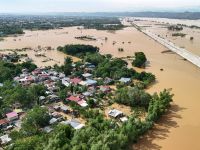U.S. President George W. Bush on Friday expressed disappointment in Palestinian Leader Yasser Arafat over the Karine A weapons ship that both Israel and the U.S. insist was headed for the Palestinian Authority.
Bush's comments came as he and his top foreign policy aides considered options for sanctioning Arafat including the severing of ties with the PA.
"I am disappointed in Yasser Arafat. He must make a full effort to rout out terror in the Middle East. Ordering up weapons that were intercepted on a boat headed for that part of the world is not part of fighting terror, that's enhancing terror. And obviously we're very disappointed in him," Bush said.
"We continue to give a strong message to Chairman Arafat that he must act and we continue to review our policy with respect to the Palestinian Authority and Chairman Arafat," U.S. Secretary of State Colin Powell told reporters. "All kinds of options are out there," he added, without providing details.
Meanwhile, US national security adviser Condoleezza Rice said in a recent interview that Arafat must take action against terrorism to allow a return to the peace process. "We need action from chairman Arafat to renounce terrorism ... and to do something about terrorism in the Palestinian Authority," Rice told Abu Dhabi satellite television.
"We do not believe that he has done everything he can to root out terrorism," she said.
Rice repeatedly called for action from Arafat noting that the 1993 Oslo peace accords "are inconsistent with terrorism, with arms smuggling into the Middle East, inconsistent with the activities of Hamas, inconsistent with Iranian interference."
Asked about a possible cut in relations with the Palestinian Authority, Rice said it was up to Arafat to move. "Secretary of State Powell made it clear to Arafat himself this is not an issue of what the United States does it is an issue of what chairman Arafat does," she insisted.
Rice said Washington did not expect 100 percent results, but did expect 100 percent effort against terrorism from Arafat to allow the peace process to resume. "We will take this step by step," she added.
Zinni
President Bush and his chief foreign policy advisers have also agreed to delay the return of the U.S. envoy to the Middle East, Anthony Zinni, until Arafat meets U.S. demands, The Washington Post reported..
In deciding to put off the return of Middle East envoy Anthony C. Zinni to the region, U.S. officials were further delaying a mission that was already on hold after his last round of talks, which ended three weeks ago.
Administration officials are also discussing whether to add the Al Aqsa Brigades, an armed group linked to Arafat's Fatah movement, to the State Department's list of foreign terrorist organizations, officials said.
U.S.-Arab Ties
The negative American approach towards the Palestinians is affecting U.S ties with the Arab World. "Relations (with Arab countries) are in a very bad state," a senior state department official said after touring the Middle East.
The official, who requested anonymity, quoted by KUNA as saying a fact-finding mission to get "the feel for the mood of Muslim and Arab opinion" was sent to the Middle East and North Africa by under secretary of state for public diplomacy Charlotte Beers and "she feels something must be done."
On the key question of the Palestinian-Israeli conflict, there is unlikely to be any softening of the administrations position vis-a-vis the Palestinians and their leader, Arafat. "The main preoccupation in Washington is the campaign against terrorism," the U.S. diplomat said.
In the United States, he conveyed, the terrorist attacks of September 11, "transformed the way people think about the outside world." There is no longer any patience with analysis, nor with violence and especially not with terrorism.
Therefore, according to the official, whenever Israeli civilians are hurt in attacks, there is "a very negative reaction" in the United States and towards the Palestinians, and there is a feeling that the Palestinian authority must do something.
Israeli Raids
Israeli warplanes attacked Palestinian security installations in the West Bank and Gaza Strip Friday night, few hours after the killing of two Palestinians in southern Gaza strip.
In Gaza, the US made F-16 warplanes pounded the Palestinian security compound known as Ansar camp, in two waves, WAFA reported.
Witnesses said huge plumes of smoke over the area after buildings belonging to the Palestinian National security forces and the navy police were hit by two bombs. The new attack completely destroyed a helicopter launch pad that had been hit in the past, Palestinian security officials and witnesses said.
At least one Palestinian was wounded in the late-night strikes, Palestinian hospital sources said.
In the West Bank city of Tulkarem, F-16 warplanes fired missiles at a Palestinian government complex that had already been largely destroyed in a similar attack by the occupation warplanes on January 18. A Palestinian security officer was killed and some 50 other people were wounded in that attack.
In another incident two Palestinians were killed by the Israeli fire near Khan Younis, Palestinian security officials said.
Also in Ramallah Israeli occupation troops fired tear gas and rubber-coated bullets against hundreds of Palestinian took to the streets to protest against Israeli occupation and aggression.
Palestinian hospital sources said 25 people were injured. They said a 17-year-old Palestinian, Samer Kesba, died from a bullet wound to the head sustained during a peaceful demonstration in Ramallah five days earlier. (Albawaba.com)
© 2002 Al Bawaba (www.albawaba.com)







